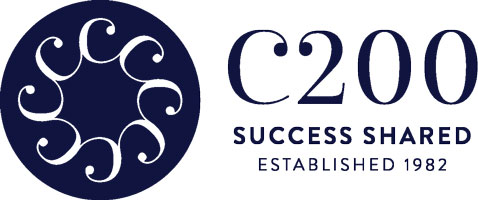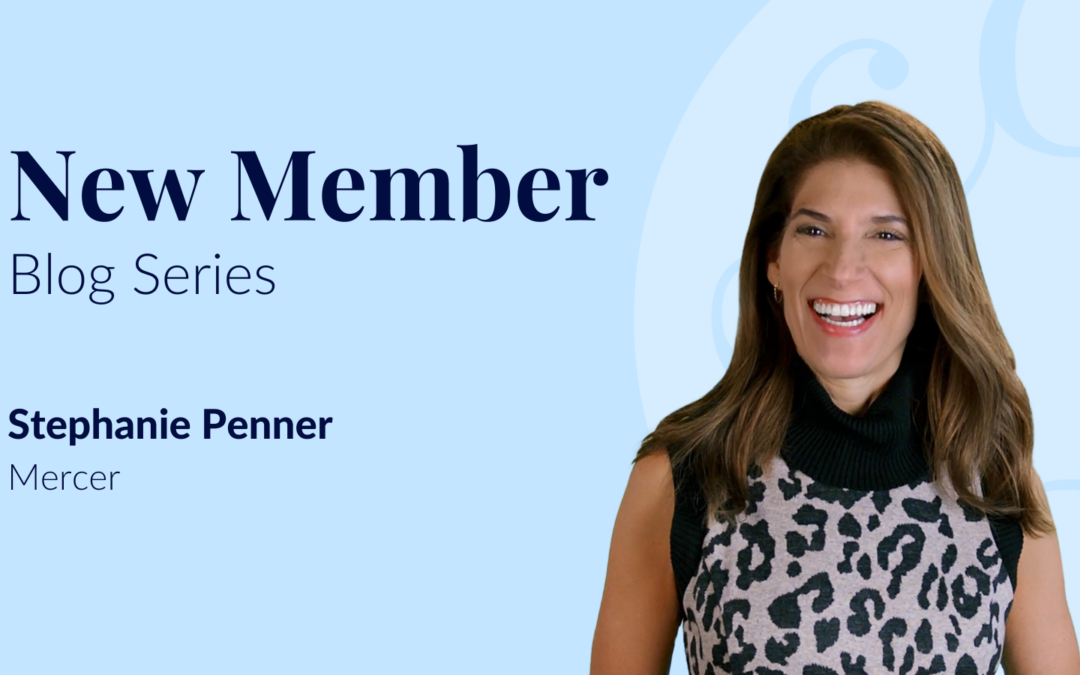Stephanie Penner is a senior partner at Mercer, a global consulting firm that specializes in helping organizations with their human resources and financial needs. Stephanie is responsible for overseeing Mercer’s offices, employees, and clients up and down the US east coast and has been with the company for 26 years. Outside of work, Stephanie enjoys taking advantage of living in New York City and spending quality time with her daughter, who also lives in New York. Stephanie has been a member of C200 since November 2023.
Eva Glassman: What is being a senior leader at Mercer like?
Stephanie Penner: When I meet people and they ask me what I do, I usually say, “Before I tell you what I do, where do you work?” Odds are, their company may just be a client of ours! I lead the eastern region of the US, from Portland, Maine down to Florida, across all of Mercer’s service lines, overseeing 20-plus offices, over 2000 employees, and thousands of clients. I’ve actually been at Mercer for 26 years and I love what I do—you better love it if you’re going to be at the same place for that long.
Mercer is a leading global consulting firm that works with employers around the world to develop and implement strategies for attracting, retaining, engaging, and ultimately retiring their workforces.
I love what I do because of the difference we make in advancing the health, wealth, and careers of what is most likely the most vital asset at an organization: its people. For example, Mercer and our services became even more relevant during the pandemic when the health and well-being of employees became a top priority. Prior to the pandemic, we had often talked with clients about the importance of telehealth as an option for employees; this refers to the use of technology to provide healthcare services remotely, but the adoption of this technology was quite low. Now, that has completely changed as telehealth has demonstrated its potential to complement traditional healthcare delivery models and improve access to care in various situations.
Another topic of great interest to our clients is how AI will revolutionize the nature of work and reshape the skills required in many industries. It can be scary, but also exciting, to think about the transformation of workforces through upskilling and reskilling and using machines to augment (not replace) human capabilities.
We truly are in complicated, fast-changing times with concurrent crises in the world impacting businesses and their workforces. Every day we see in the news stories about economic, social, and climate pressures including labor shortages, inflation, mental health deterioration, technological change and disruption, population aging and longevity, chronic health conditions, and preparing for the future of work in the era of generative AI. I feel fortunate in working at Mercer to have the opportunity to find solutions to these complex people risks that have a direct impact on businesses, our economies, and people’s lives.
EG: Where did you start out in your career, and what’s it like working at the same company for so long? How has your career journey been shaped by that experience?
SP: I went to University of Pennsylvania – Wharton for an undergraduate business degree. I had an affinity for numbers and ended up becoming a compensation consultant with a competitor firm for around five or six years before joining Mercer. I actually interviewed with Mercer when I was two months into my maternity leave—because what else would a woman do during that time? [laughs] My daughter was four months old when I joined Mercer and I’ve never looked back.
My journey at Mercer started off with me as an individual consultant, so I was focused on working across a variety of client projects and ensuring we were servicing and delivering on the commitments to those clients. Over time, I started to take on more management and leadership roles and broadened my experience across our entire portfolio.
At the time, I was based in Philadelphia, but because Mercer is so large and complex, I was able to interact with many other colleagues and clients across and outside the US despite living in Philadelphia the whole time. I never felt stagnant as I was able to reap the benefit of being at a large global organization and build a network that was broad and deep in geographic and technical span.
I lived in Philadelphia for 20 years and moved to New York City in March 2019 when I was asked to lead across all our business lines. I was able to experience a good year in the “city that never sleeps” until we all “went to sleep,” so to speak—when the pandemic hit. However, I ended up loving New York, even in the middle of a global health crisis, and I’m still living here today.
EG: What factors do you attribute to your success and advancement in your career?
SP: I’ve always been conscious of relationship building, making sure I cast a wide net of connections and nurture them along the way. I also make sure not to burn any bridges and understand the purpose of a connection at any point in time. Since there are 25,000 employees at Mercer, I never felt the need to go to another company to build new connections; there were always new ones coming.
This might seem cliché, but I’ve found that the most successful people are those who find opportunity even in challenging situations, and when they encounter adversity, they’re able to have resilience coupled with a positive mindset. That not only allows you to figure out how to solve for something, but you also inspire others to work through change. That outlook really helped me over the course of my career. Change is a constant in today’s world, so having a muscle for it that I’ve built over time has helped me accept change as part of the everyday equation.
Lastly, I have had champions, mentors, and advocates for myself over the years, people who’ve seen something in me that I hadn’t seen in myself. They are people I’ve been able to lean on for advice or an open door, and while I can’t pay them back in the same way, I often will pay it forward to others.
EG: Tell me about the people you turned to for advice going up in your career. Were the mostly women? Men?
SP: I absolutely did have female mentors, but they weren’t my only mentors. Many of my mentors were men as well, and I believe that ultimately benefitted me because they already had a seat at the table and were looking to make room for me. When I was entering the working world, there weren’t as many women leaders, and the women that were there were also still trying to prove themselves in a male-dominated environment. Now that I have a seat at the table, I help other women also get a seat.
EG: How did you get involved with C200? What drew you to the organization and community?
SP: My C200 journey can be summed up with the words, “Timing is everything.” I was introduced to C200 through Mary Tinebra. She’s a mentor of mine, but she’s also so much more than that. She’s been a champion and advocate for me over my entire time at Mercer.
I started getting involved in some different groups when I first moved to New York that were more social, and I was still looking for a professional organization. Over lunch one day, Mary suggested I look into C200, right before the 2023 Empowering Women Summit in Atlanta. The timing could not have been better; I actually had a business trip to Atlanta planned that week, which was ending on the same day the Summit began. All I had to do was switch hotels!
EG: That’s a sign from the universe!
SP: Yes! It was telling me, “You really need to look into this group!”
I was blown away at the Summit; it was such a unique experience. The whole agenda hit me in so many different places; one speaker who talked about the importance of patience in leadership really struck me. There were so many tidbits that I took away from the event and was able to share in my work world.
I was also incredibly impressed by the C200 members in attendance—not only at the composition of the group, but also at how many female founders as well as corporate leaders there were. Some of them were in the consulting space like me, others on corporate boards, others small business owners, others retired. It was such a great array of experiences of successful, powerful, collaborative women, and I immediately knew that C200 had the diversity of the professional organization I was seeking. While there were several professional organizations I was exploring, C200 felt unique with a well-rounded membership and a variety of ways to engage, and I really valued that.
EG: What does being a “woman in business” mean to you, if anything? And how do you apply that thinking to what you do in your life?
SP: It’s hard for me to answer that question, because I feel so valued regardless of my gender. I also know that it’s an important question, because not everyone has that same feeling. I feel a certain sense of responsibility to demonstrate that I am a strong leader regardless of my gender; my career is not a story of feeling at a disadvantage for being a woman.
I sometimes don’t even like some of the questions that women in the workplace get asked. For example, when I’m asked, “How do you create your work-life balance?” I know that a man would not be asked that question. And yet, I know that there are women who do struggle with that.
As a woman in business, it’s important to be a role model for both women and men, to be a good leader regardless of gender. I often like to share about how I’ve made choices in my life that have allowed me to follow my true purpose, and I feel fortunate to have found that in my life both personally and professionally. I never felt like I needed to give 100% of my time in one place, and at the exact same time, 100% someplace else. That’s 200% of one person—that’s impossible. I’ve struck a balance for what has worked for me. Everyone has a different view on what the “right” balance is of all your priorities in life.
EG: Some women find the question of being a “woman in business” easy to answer, and some find it difficult, but that’s exactly why a question like that is important to ask. It challenges us to think about why we ask certain questions about certain people, and to reconcile how we feel in the world versus how we’re perceived. Sometimes, those seemingly-contradictory answers can coexist. It’s super complicated, but I think that’s wonderful.
SP: Something I’ve always told my daughter, who’s now a 26-year-old independent woman, is: “You are my top priority in life. You cannot be my top priority every day.” She grew up truly understanding that, and it’s actually made her appreciate the complexity of prioritizing, making choices, and being happy about those choices.
Being a woman in business, I know that I bring a diversity of thought and different sense of emotional intelligence; I know that sharing my story is important and how I got to where I am. At the same time, I hesitate to say that women are more emotionally intelligent, because I know that’s a stereotype and generalization. For myself, I know I’m someone who has a greater influence because of my strong sense of who my particular audience is, and I can tune into that to truly speak to them.
EG: To shift gears quite a bit: How do you like to spend your time outside of work?
SP: I’ve been immersing myself in a wide variety of New York City experiences. Even though I’ve lived here full time since 2019, it still feels new because of the pandemic. I spend my time going to museums, seeing live music, Broadway shows, biking in Central Park. The concentration of arts and culture here in New York is so impressive.
My daughter also lives in New York City. We both lead very busy lives, but we’re extremely close and get together weekly for lunch, dinner, or shopping. I love it and try to take advantage of city living.
When I want to get out of the city, I always enjoy a long weekend somewhere. I recently visited the Dominican Republic for a beach vacation, and I love going to a lake house or going with friends boating on the Chesapeake Bay or skiing in Utah. Those are the kinds of travel experiences I like to weave into my annual calendar; travel doesn’t always need to be a full week or two weeks away.
EG: You mentioned earlier that a lot of the people you mentor are women. What are the kinds of things you hear from them, and what’s your advice to them and to women in general going up in their careers?
SP: A lot of the young women I mentor are trying to figure out their voice: when to speak up, how they speak up, what kinds of words they use, how they position something. Helping them find their voice in a way that feels authentic, meaningful, and powerful is something I focus on a lot. If we’re talking in a Zoom meeting or in person, I’ll give them immediate feedback if they are not presenting themselves in the right way. I’ll even do that to men as well! If you don’t present yourself authentically and confidently, you can actually diminish your credibility. I’ll say something like, “I want to hear every word you say; don’t dilute the power of your message with filler words.” They always appreciate the feedback; better to get it early on before it becomes a habit that’s hard to change.
Another thing I help people navigate as a mentor is the politics of an organization. When you’re in any sort of relationship, whether it’s personal or professional, it’s not going to be smooth sailing the entire time. In personal relationships, you’re going to have fights; in professional ones, you’re going to disagree and get annoyed. The key is determining how to channel that negative energy in a mature, professional, and productive way.
Finally, I always get questions about work-life balance and statements of, “I feel guilty if I don’t go to my kids’ _______.” I always share my perspective about my daughter being my top priority in life, but not necessarily every day. I was fortunate to have a very good support system for raising my daughter; her dad was always around and able to attend all her sports events. Again, you don’t need to give 100% here and 100% there at the same time.
Related to the idea of work-life balance is the importance of choosing how to spend your hours wisely. We all have the same 24 hours in a day; within the past few years, I’ve made a consistent effort to remove from my vocabulary the phrase, “I didn’t have time to ______.” That statement isn’t an honest one. We all have time; what you’re really saying is, “I didn’t make time.” That reframe made me think differently about how I prioritize my time. Every day, I’m the one choosing where to spend my time.
EG: Why C200? What are you most excited about as a new member?
SP: I want to explore some of the different Committees and Councils available; I definitely want to become a more active member in C200. And definitely attend some in-person events!


